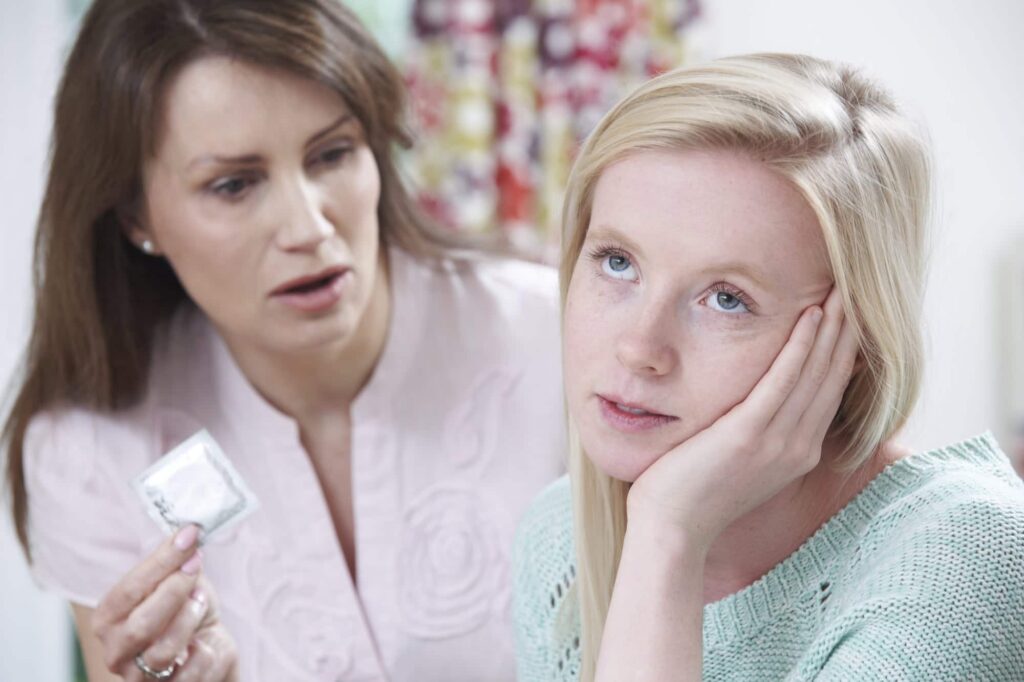
For the month of October 2023, we are focusing on parenting teens. Critical topics to discuss with teens are sex and relationships. As parents, it can feel uncomfortable or even daunting to have conversations with our teenagers about sex and relationships. However, these conversations are essential for their healthy development and well-being. Many adolescents receive incomplete or inaccurate information about sex from their peers or the media, which can lead to potentially harmful behaviors and beliefs. By openly discussing topics such as consent, pleasure, and building healthy relationships, parents can play a crucial role in empowering their teens to make informed decisions and navigate the complexities of adulthood. Our discussion with Dr. Laura Deitsch explores the importance of talking to your teens about sex and relationships and provides guidance for parents on how to approach these conversations with confidence and care.
Open and honest conversations about sex and relationships with your teens lay the foundation for a healthy and informed decision-making process, guiding them towards safe and fulfilling experiences.
In a recent podcast episode, we sat down with Dr. Laura Dietsch, also known as Dr. Shameless, to discuss how parents can talk to their teens about sex. She has a passion for working with diverse groups of people in the Las Vegas community on health education, social and reproductive justice and mental health issues.
Dr. Laura’s Tips:
- Values Check Before Teen Talk – It’s important for parents to check their own values before discussing the topic with their teens.
- Gender, Comfort, and Consent – Ask teens to assess their own comfort levels and to communicate them clearly when in situations.
- Trust, Respect, Communication – These are key relationship principles. It’s important to establish trust, respect, and communication in relationships, using examples from media and real life. Laura suggests using concrete examples to help abstract concepts like trust and respect become more understandable. She also emphasizes the importance of being respectful in relationships, even in situations that may not be enjoyable, like a boring volleyball game.
- Children’s Relationships and Body Image – Offer mindful communication and body image education with your children, be aware of how you talk about your own bodies and to challenge societal norms that cause body shame.
- Open Conversations With Children – Laura emphasized the importance of starting open and honest conversations with children at a young age to make these discussions less awkward as they grow older. She suggests using third person or external examples to initiate conversations and to not make these conversations feel like a confrontation.
- Respectful Touch and Consent in Parenting – Model respectful touch and consent, such as allowing children to decline hugs or kisses. Laura highlighted the seriousness of respecting a child’s body autonomy, even if they are a parent’s child.
- Boundaries and Consequences – Set clear boundaries and consequences for boundary violations.
- Inclusive Language and Safe Relationships – We also discussed the importance of inclusive language and educating themselves on different types of relationships. As parents, we need to create a safe space for children to ask questions and to avoid making them feel judged or shameful.
Sex Ed Resources and Open Conversation
Online resources like the YouTube Channel Sexplanations and the website Scarleteen are beneficial, and suggested looking to local LGBTQ+ centers and gender-affirming therapists, like Dr. Laura, for additional resources. They also emphasized the value of open conversation about different types of relationships and experiences.
Polyamory, Communication and Societal Shifts
Laura shares a story of her friend’s polyamorous relationship, in which the parents’ healthy and consensual relationship dynamics were mirrored by their children, including a daughter who identified as a lesbian and was in a healthy relationship. Jessica noted the shift in societal norms, with more of her clients now in polyamorous relationships, and emphasized the importance of clear communication in such arrangements.
About Dr. Laura Deitsch
Dr. Laura Deitsch, also known as Dr. Shameless helps guide people – regardless of age, gender, identity, experience and anything else – on a journey from sexual shame to courage in order to be your most authentic sexual self. Her approach has people examine the origins of shame, deconstruct the validity of shameful self-talk, identify the harm shame causes, and create a new paradigm embracing the bold, genuine and healthier attitudes living beneath the surface.
Laura has a passion around joy, personal growth and pleasure for pleasure’s sake. She is a Licensed Clinical Professional Counselor in Nevada and holds a Master’s degree from the University of Florida in Health Science Education, a Master’s degree from the University of Nevada, Las Vegas, in Counselor Education, and a Doctorate of Human Sexuality degree from the Institute for Advanced Study of Human Sexuality in San Francisco, California. She has been practicing as a therapist in Las Vegas since 2009. She grew up in New York and South Florida and enjoys her pets, friends and sharing helpful information about reproductive justice and health. She can often be found at local school board meetings advocating for real sex ed, inclusive policies, and access to care. She is engaged in local, state and national political activities.
Be sure to follow Laura “Dr. Shameless” on social media: Facebook & Instagram